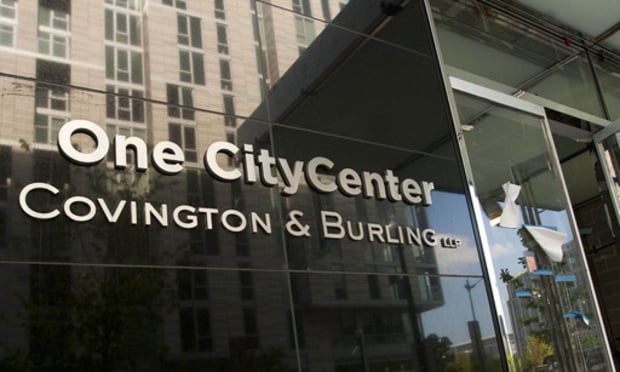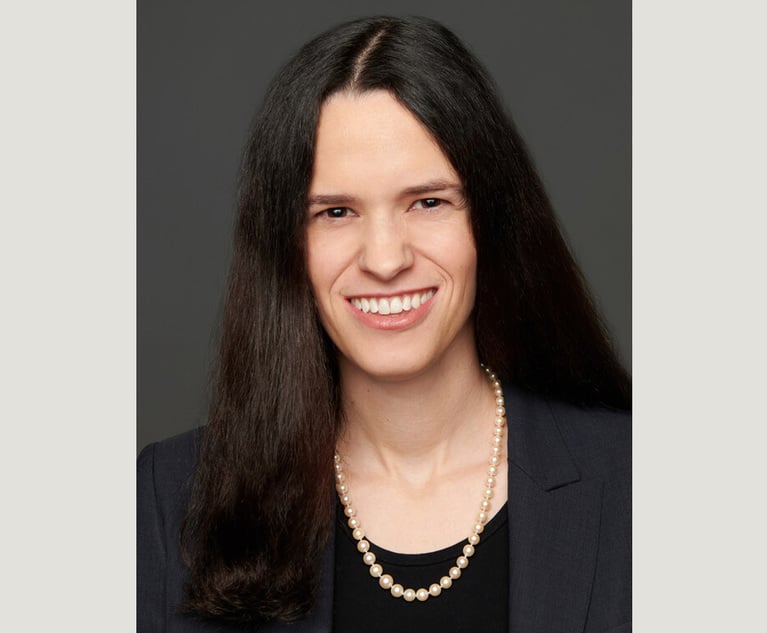Big Law Winning Millions in Fees After Trump Caves on Census Litigation
The most recent settlement will see $2.5 million awarded to Covington & Burling and another $1.45 million to immigration and civil rights groups.
October 01, 2019 at 05:23 PM
5 minute read
 Covington & Burling offices in Washington. Photo by Diego M. Radzinschi/THE NATIONAL LAW JOURNAL
Covington & Burling offices in Washington. Photo by Diego M. Radzinschi/THE NATIONAL LAW JOURNAL
The federal government has agreed to pay $6.65 million in legal fees tied to the Trump administration's failed attempt to add a citizenship question to the 2020 census.
The most recent settlement will see $2.5 million awarded to Covington & Burling and another $1.45 million to immigration and civil rights groups. Arnold & Porter and the ACLU also got $2.7 million for similar litigation in New York, and a filing deadline for a third case in California is set for Oct. 11.
The California lawsuit involved some attorneys from Holland & Knight, who represented Los Angeles County. However, they did not file for attorney fees.
State attorneys for California have filed for attorneys fees, as has the education law firm Dannis Woliver Kelley.
In a copy of the settlement reached between Covington and Department of Justice attorneys, announced by the DOJ Monday, the federal government agreed to pay $2.2 million in attorney fees and another $300,000 in other costs, for a total of $2.5 million.
That's a significant cut to the more than $7.3 million Covington initially requested in an Aug. 15 filing. That court document said, under local guidelines, the law firm should be awarded at least $2.8 million.
The terms of the settlement means Covington received roughly $290,000 less than the minimum amount it said it should receive in the case.
Federal law allows parties in civil lawsuits to recoup costs from the federal government, in certain circumstances. BuzzFeed News first reported on the settlements in the Maryland and New York cases.
In the August filing, Covington argued they should be awarded attorney fees because it "prevailed outright against Defendants as a matter of law, and achieved this lawsuit's fundamental objective: to enjoin Defendants from inquiring about citizenship as part of the 2020 decennial Census."
"The Secretary of Commerce took his unlawful action willfully—in the face of the unanimous contrary recommendation of the sitting Director of the U.S. Census Bureau, its Chief Scientist, and other Census Bureau experts—and then misled both Congress and the public about the true impetus for the decision," the filing states. "Defendants compounded this manipulation and corruption of the administrative process with attempts in this litigation to improperly curate the administrative record and insulate the Secretary's real reasons for the decision from effective review."
The Covington lawyers argued that, as a result, they should be awarded fees "at prevailing market rates."
They pointed to their office's location in Washington, D.C., as to why the payment should be adjusted upward from the general guidelines for cost-of-living expenses.
They also said Covington's status as "a highly regarded firm with expertise in complex litigation" also meant that the court should adjust the rates above the guidelines.
At a maximum, they requested a total payment of nearly $7.3 million to cover attorney fees and other expenses. But they argued, under the guidelines, they were entitled to at least $2.8 million.
Declarations submitted with the request for attorney fees showed the billing rates for several Covington partners and associates.
For example, Shankar Duraiswamy, a partner at Covington's D.C. office, stated in the filing that his billing rate in 2018 was $825 an hour and increased to $895 an hour in 2019. Under those standard rates, his total fees for working on the litigation reached $1,185,859, according to an exhibit filed in court.
Another partner at Covington's New York office, Benjamin Duke, billed $1,120 an hour in 2019, up from $1,070 in 2018. His fees earned on the case, at those rates, totaled $1,602,403.
They were joined by eight associates at Covington, as well as two paralegals, a special counsel and a senior counsel.
Covington represented individual plaintiffs in the Maryland census lawsuit who argued that asking about citizenship on the 2020 census would decrease response rates for immigrant communities and lead to an inaccurate population count.
The U.S. Supreme Court found in a 5-4 decision that Commerce Secretary Wilbur Ross was not forthright in his rationale for adding the question, and remanded the matter back to the agency. President Donald Trump still attempted to include the question on the survey, but officials eventually dropped the effort.
Those plaintiffs represented by Covington were joined in their lawsuit by several immigrant and civil rights organizations. Those groups also settled with the DOJ for attorney fees, receiving $1.45 million after originally requesting about $4.7 million from the government.
That means the Justice Department will pay a total of $3.95 million in legal fees for the Maryland case.
The DOJ settled with the ACLU and Arnold & Porter in federal court in New York earlier this year over attorney fees in another census lawsuit, agreeing to pay the organization $2.7 million, according to BuzzFeed News.
Attorney fees are still pending in federal court in California, where the citizenship question was also challenged. U.S. District Judge Richard Seeborg for the Northern District of California recently extended the deadline to file a motion for attorney fees to Oct. 11, a sign that a similar settlement could be in the works.
Read More:
Arnold & Porter, ACLU, NYCLU Reach Settlement on Attorney Fees in Census Case
Meet the 3 Judges Who've Checked Trump's Census Citizenship Question
Justices, Blocking Citizenship Question on Census, Call Trump's Push 'Contrived'
This content has been archived. It is available through our partners, LexisNexis® and Bloomberg Law.
To view this content, please continue to their sites.
Not a Lexis Subscriber?
Subscribe Now
Not a Bloomberg Law Subscriber?
Subscribe Now
NOT FOR REPRINT
© 2025 ALM Global, LLC, All Rights Reserved. Request academic re-use from www.copyright.com. All other uses, submit a request to [email protected]. For more information visit Asset & Logo Licensing.
You Might Like
View All
In-House Moves of the Month: Boeing Loses Another Lawyer, HubSpot Legal Chief Out After 2 Years
5 minute read
After Regime Change, Syria Remains Liable in US Federal Courts for Alleged Assad-Era Terrorism Support
3 minute read

Split 4th Circuit Ruling Is a Win for Covington & Burling in US Army Base Attack Litigation
3 minute readTrending Stories
Who Got The Work
J. Brugh Lower of Gibbons has entered an appearance for industrial equipment supplier Devco Corporation in a pending trademark infringement lawsuit. The suit, accusing the defendant of selling knock-off Graco products, was filed Dec. 18 in New Jersey District Court by Rivkin Radler on behalf of Graco Inc. and Graco Minnesota. The case, assigned to U.S. District Judge Zahid N. Quraishi, is 3:24-cv-11294, Graco Inc. et al v. Devco Corporation.
Who Got The Work
Rebecca Maller-Stein and Kent A. Yalowitz of Arnold & Porter Kaye Scholer have entered their appearances for Hanaco Venture Capital and its executives, Lior Prosor and David Frankel, in a pending securities lawsuit. The action, filed on Dec. 24 in New York Southern District Court by Zell, Aron & Co. on behalf of Goldeneye Advisors, accuses the defendants of negligently and fraudulently managing the plaintiff's $1 million investment. The case, assigned to U.S. District Judge Vernon S. Broderick, is 1:24-cv-09918, Goldeneye Advisors, LLC v. Hanaco Venture Capital, Ltd. et al.
Who Got The Work
Attorneys from A&O Shearman has stepped in as defense counsel for Toronto-Dominion Bank and other defendants in a pending securities class action. The suit, filed Dec. 11 in New York Southern District Court by Bleichmar Fonti & Auld, accuses the defendants of concealing the bank's 'pervasive' deficiencies in regards to its compliance with the Bank Secrecy Act and the quality of its anti-money laundering controls. The case, assigned to U.S. District Judge Arun Subramanian, is 1:24-cv-09445, Gonzalez v. The Toronto-Dominion Bank et al.
Who Got The Work
Crown Castle International, a Pennsylvania company providing shared communications infrastructure, has turned to Luke D. Wolf of Gordon Rees Scully Mansukhani to fend off a pending breach-of-contract lawsuit. The court action, filed Nov. 25 in Michigan Eastern District Court by Hooper Hathaway PC on behalf of The Town Residences LLC, accuses Crown Castle of failing to transfer approximately $30,000 in utility payments from T-Mobile in breach of a roof-top lease and assignment agreement. The case, assigned to U.S. District Judge Susan K. Declercq, is 2:24-cv-13131, The Town Residences LLC v. T-Mobile US, Inc. et al.
Who Got The Work
Wilfred P. Coronato and Daniel M. Schwartz of McCarter & English have stepped in as defense counsel to Electrolux Home Products Inc. in a pending product liability lawsuit. The court action, filed Nov. 26 in New York Eastern District Court by Poulos Lopiccolo PC and Nagel Rice LLP on behalf of David Stern, alleges that the defendant's refrigerators’ drawers and shelving repeatedly break and fall apart within months after purchase. The case, assigned to U.S. District Judge Joan M. Azrack, is 2:24-cv-08204, Stern v. Electrolux Home Products, Inc.
Featured Firms
Law Offices of Gary Martin Hays & Associates, P.C.
(470) 294-1674
Law Offices of Mark E. Salomone
(857) 444-6468
Smith & Hassler
(713) 739-1250










